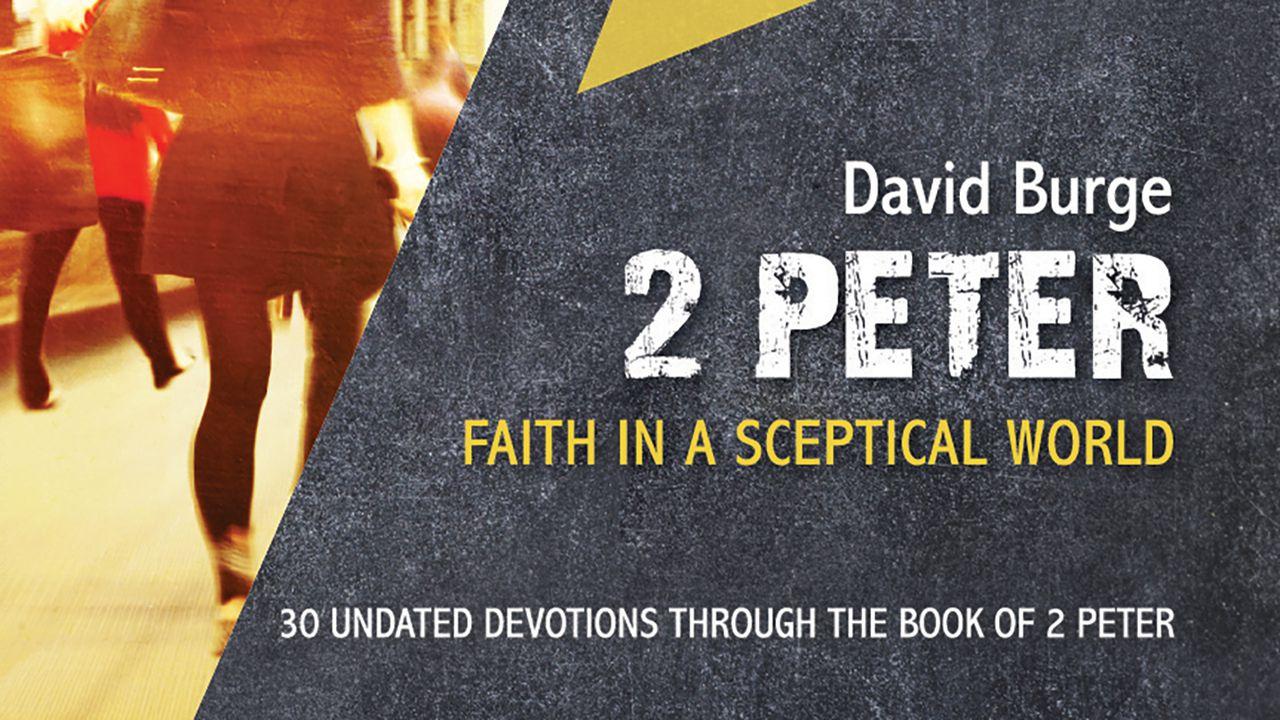2 Peter: Faith In A Skeptical World Sample

When will I ever cease being proud? Why do I continue to seek the approval of people more than the approval of God? Why do I find it so hard to forgive? When will I grow out of self-pity and discontentment?
Often many of us Christians feel defeated and discouraged by our seemingly overwhelming struggle to resist sin and to embrace Christ’s likeness. Others might seek to let themselves off the hook, as though sin were inevitable, and the fight against it a lost cause.
In verse 3, what Peter says helps us to avoid both of these responses of despair and apathy. God’s ‘divine power has given us everything we need for life and godliness’! What a profound truth to get our heads around!
Notice again, Peter emphasizes knowledge, saying that it is through our knowledge of Him that God’s power takes effect in us (v. 3). This is similar to the point made in Romans, that we are ‘transformed by the renewing of [our] mind’ (Rom. 12:2). God transforms us in large part by informing us, so that we ‘participate’ (v. 4) with Him in the process of our sanctification; we intentionally pursue holiness.
As we grasp the truth and ‘great and precious promises’ (v. 4) of God, the transformation begins and will continue. In Christ, we also ‘participate in the divine nature’ (v. 4) – a phrase describing our union with God by His Spirit so that we begin a moral transformation to be like Him. Sharers in the divine nature have thus found a new power to ‘escape the corruption in the world caused by evil desires’ (v. 4).
In verses 1–4 we notice the many causes and forces that God has used to bring about change in our life: it was ‘through the righteousness of our God’ (v. 1), but also through His ‘grace and peace’ and ‘through the knowledge of God’ (v. 2). We credit too ‘His divine power’ (v. 3) and the changes brought by our ‘knowledge of him’ (v. 3). Yet it was also because of His call of us (v. 3) and ‘through these ... great and precious promises’ (v. 4), as well as our partaking ‘in the divine nature’ (v. 4).
While such overlapping causal forces might make it difficult to generate a satisfactory explanatory flow-chart, the text instead intends that we sense that our transformation comes via a gracious flood of God’s power at work in us and for us.
Before Peter describes the efforts we are to make in our own transformation (in v. 5 onwards), it is important to see just how indebted we are to God’s grace (v. 2) and calling (v. 3). He, not us, is the Prime Mover in our salvation and sanctification. His divine power is responsible for our new beginning as well as our ongoing transformation and godliness. His divine power means we have no reason for despair or apathy, but in their place, grateful confidence.
Reflection
Which sins do you sometimes feel complacent about, or find hard to overcome? Why not ask right now for God's help in battling against them?
Scripture
About this Plan

Your faith is precious! So often, though, we can feel weak, irrelevant and marginalized. Living in a skeptical world where truth is twisted and false teaching abounds isn’t easy. Peter knew about the challenges of living in such a world, but he also knew Jesus deeply, and he was utterly convinced of the importance of trusting Jesus and living for Him. Bible teacher David Burge delves into this letter and highlights relevant applications for our lives today. Be reminded of the truth about Jesus, motivated to continue to trust him and equipped for living in a skeptical world with these thirty undated devotions.
More
Related plans

Sport Films + Faith: How Does God Speak Through These Movies?

With God, Truly ANYTHING Is Possible

The Results of a New Life in Christ

The Promise of Light

A Mother’s Day Celebration of God’s Care

God, Turn My Worry to Worship

All In, All Yours: Stepping Into God’s Peace and Promises by Heidi Lee Anderson

7 Habits of a Mature Disciple

21 Days of Prayer and Fasting: Deeper
